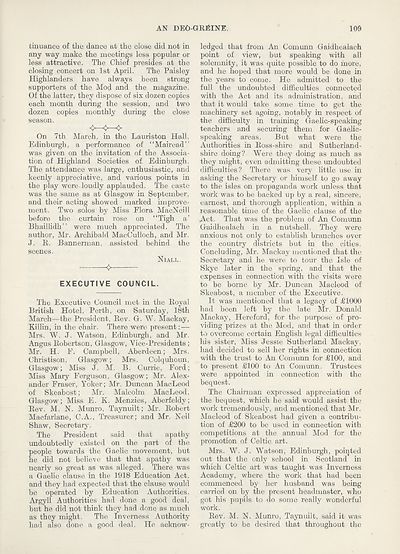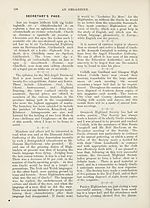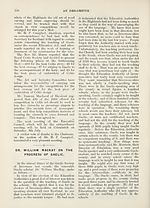An Comunn Gàidhealach Publications > Deo-gréine > Volume 17, October 1921 to September 1922
(117) Page 109
Download files
Complete book:
Individual page:
Thumbnail gallery: Grid view | List view

AN DEO-GRfilNE.
109
tinuance of the dance at the close did not in
any way make the meetings less popular or
less attractive. The Chief presides at the
closing concert on 1st April. The Paisley
Highlanders have always been strong
supporters of the Mod and the magazine.
Of the latter, they dispose of six dozen copies
each month during the session, and two
dozen copies monthly during the close
season.
On 7th March, in the Lauriston Hall,
Edinburgh, a performance of “Mairead”
was given on the invitation of the Associa¬
tion of Highland Societies of Edinburgh.
The attendance was large, enthusiastic, and
keenly appreciative, and various points in
the play were loudly applauded. The caste
was the same as at Glasgow in September,
and their acting showed marked improve¬
ment. Two solos by Miss Flora MacNeill
before the curtain rose on “Tigh a’
Bhaillidh” were much appreciated. The
author, Mr. Archibald MacCulloch, and Mr.
J. R. Bannerman, assisted behind the
scenes.
Niall.
4*
EXECUTIVE COUNCIL.
The Executive Council met in the Royal
British Hotel, Perth, on Saturday, 18th
March—the President, Rev. G. W. Mackay,
Killin, in the chair. There were present—
Mrs. W. J. Watson, Edinburgh, and Mr.
Angus Robertson, Glasgow, Vice-Presidents ;
Mr. H. E. Campbell, Aberdeen; Mrs.
Christison, Glasgow; Mrs. Colquhoun,
Glasgow; Miss J. M. B. Currie, Ford;
Miss Mary Ferguson, Glasgow; Mr. Alex¬
ander Fraser, Yoker; Mr. Duncan MacLeod
of Skeabost; Mr. Malcolm MacLeod,
Glasgow; Miss E. K. Menzies, Aberfeldy;
Rev. M. N. Munro, Taynuilt; Mr. Robert
Macfarlane, C.A., Treasurer; and Mr. Neil
Shaw, Secretary.
The President said that apathy
undoubtedly existed on the part of the
people towards the Gaelic movement, but
he did not believe that that apathy was
nearly so great as was alleged. There was
a Gaelic clause in the 1918 Education Act,
and they had expected that the clause would
be operated by Education Authorities.
Argyll Authorities had done a good deal,
but he did not think they had done as much
as they might. The Inverness Authority
had also done a good deal. He acknow¬
ledged that from An Comunn Gaidhealach
point of view, but speaking with all
solemnity, it was quite possible to do more,
and he hoped that more would be done in
the years to come. He admitted to the
full the undoubted difficulties connected
with the Act and its administration, and
that it would take some time to get the
machinery set agoing, notably in respect of
the difficulty in training Gaelic-speaking
teachers and securing them for Gaelic¬
speaking areas. But what were the
Authorities in Ross-shire and Sutherland-
shire doing? Were they doing as much as
they might, even admitting these undoubted
difficulties? There was very little use in
asking the Secretary or himself to go away
to the isles on propaganda work unless that
work was to be backed up by a real, sincere,
earnest, and thorough application, within a
reasonable time of the Gaelic clause of the
Act. That was the problem of An Comunn
Gaidhealach in a nutshell. They were
anxious not only to establish branches over
the country districts but in the cities.
Concluding, Mr. Mackay mentioned that the
Secretary and he were to tour the Isle of
Skye later in the spring, and that the
expenses in connection with the visits were
to be borne by Mr. Duncan Macleod of
Skeabost, a member of the Executive.
It was mentioned that a legacy of £1000
had been left by the late Mr. Donald
Mackay, Hereford, for the purpose of pro¬
viding prizes at the Mod, and that in order
to overcome certain English legal difficulties
his sister, Miss Jessie Sutherland Mackay,
had decided to sell her lights in connection
with the trust to An Comunn for £100, and
to present £100 to An Comunn. Trustees
were appointed in connection with the
bequest.
The Chairman expressed appreciation of
the bequest, which he said would assist the
work tremendously, and mentioned that Mr.
Macleod of Skeabost had given a contribu¬
tion of £200 to be used in connection with
competitions at the annual Mod for the
promotion of Celtic art.
Mrs. W. J. Watson, Edinburgh, pointed
out that the only school in Scotland* in
which Celtic art was taught was Inverness
Academy, where the work that had been
commenced by her husband was being
carried on by the present headmaster, who
got his pupils to do some really wonderful
work.
Rev. M. N. Munro, Taynuilt, said it was
greatly to be desired that throughout the
109
tinuance of the dance at the close did not in
any way make the meetings less popular or
less attractive. The Chief presides at the
closing concert on 1st April. The Paisley
Highlanders have always been strong
supporters of the Mod and the magazine.
Of the latter, they dispose of six dozen copies
each month during the session, and two
dozen copies monthly during the close
season.
On 7th March, in the Lauriston Hall,
Edinburgh, a performance of “Mairead”
was given on the invitation of the Associa¬
tion of Highland Societies of Edinburgh.
The attendance was large, enthusiastic, and
keenly appreciative, and various points in
the play were loudly applauded. The caste
was the same as at Glasgow in September,
and their acting showed marked improve¬
ment. Two solos by Miss Flora MacNeill
before the curtain rose on “Tigh a’
Bhaillidh” were much appreciated. The
author, Mr. Archibald MacCulloch, and Mr.
J. R. Bannerman, assisted behind the
scenes.
Niall.
4*
EXECUTIVE COUNCIL.
The Executive Council met in the Royal
British Hotel, Perth, on Saturday, 18th
March—the President, Rev. G. W. Mackay,
Killin, in the chair. There were present—
Mrs. W. J. Watson, Edinburgh, and Mr.
Angus Robertson, Glasgow, Vice-Presidents ;
Mr. H. E. Campbell, Aberdeen; Mrs.
Christison, Glasgow; Mrs. Colquhoun,
Glasgow; Miss J. M. B. Currie, Ford;
Miss Mary Ferguson, Glasgow; Mr. Alex¬
ander Fraser, Yoker; Mr. Duncan MacLeod
of Skeabost; Mr. Malcolm MacLeod,
Glasgow; Miss E. K. Menzies, Aberfeldy;
Rev. M. N. Munro, Taynuilt; Mr. Robert
Macfarlane, C.A., Treasurer; and Mr. Neil
Shaw, Secretary.
The President said that apathy
undoubtedly existed on the part of the
people towards the Gaelic movement, but
he did not believe that that apathy was
nearly so great as was alleged. There was
a Gaelic clause in the 1918 Education Act,
and they had expected that the clause would
be operated by Education Authorities.
Argyll Authorities had done a good deal,
but he did not think they had done as much
as they might. The Inverness Authority
had also done a good deal. He acknow¬
ledged that from An Comunn Gaidhealach
point of view, but speaking with all
solemnity, it was quite possible to do more,
and he hoped that more would be done in
the years to come. He admitted to the
full the undoubted difficulties connected
with the Act and its administration, and
that it would take some time to get the
machinery set agoing, notably in respect of
the difficulty in training Gaelic-speaking
teachers and securing them for Gaelic¬
speaking areas. But what were the
Authorities in Ross-shire and Sutherland-
shire doing? Were they doing as much as
they might, even admitting these undoubted
difficulties? There was very little use in
asking the Secretary or himself to go away
to the isles on propaganda work unless that
work was to be backed up by a real, sincere,
earnest, and thorough application, within a
reasonable time of the Gaelic clause of the
Act. That was the problem of An Comunn
Gaidhealach in a nutshell. They were
anxious not only to establish branches over
the country districts but in the cities.
Concluding, Mr. Mackay mentioned that the
Secretary and he were to tour the Isle of
Skye later in the spring, and that the
expenses in connection with the visits were
to be borne by Mr. Duncan Macleod of
Skeabost, a member of the Executive.
It was mentioned that a legacy of £1000
had been left by the late Mr. Donald
Mackay, Hereford, for the purpose of pro¬
viding prizes at the Mod, and that in order
to overcome certain English legal difficulties
his sister, Miss Jessie Sutherland Mackay,
had decided to sell her lights in connection
with the trust to An Comunn for £100, and
to present £100 to An Comunn. Trustees
were appointed in connection with the
bequest.
The Chairman expressed appreciation of
the bequest, which he said would assist the
work tremendously, and mentioned that Mr.
Macleod of Skeabost had given a contribu¬
tion of £200 to be used in connection with
competitions at the annual Mod for the
promotion of Celtic art.
Mrs. W. J. Watson, Edinburgh, pointed
out that the only school in Scotland* in
which Celtic art was taught was Inverness
Academy, where the work that had been
commenced by her husband was being
carried on by the present headmaster, who
got his pupils to do some really wonderful
work.
Rev. M. N. Munro, Taynuilt, said it was
greatly to be desired that throughout the
Set display mode to:
![]() Universal Viewer |
Universal Viewer | ![]() Mirador |
Large image | Transcription
Mirador |
Large image | Transcription
| An Comunn Gàidhealach > An Comunn Gàidhealach Publications > Deo-gréine > Volume 17, October 1921 to September 1922 > (117) Page 109 |
|---|
| Permanent URL | https://digital.nls.uk/127171377 |
|---|
| Description | Leabhar 17, Treasamh Mios an Fhoghair 1921 gu Dara Mìos an Fhoghair 1922 |
|---|---|
| Attribution and copyright: |
|
| Description | This contains items published by An Comunn, which are not specifically Mòd-related. It includes journals, annual reports and corporate documents, policy statements, educational resources and published plays and literature. It is arranged alphabetically by title. |
|---|
| Description | A collection of over 400 items published by An Comunn Gàidhealach, the organisation which promotes Gaelic language and culture and organises the Royal National Mòd. Dating from 1891 up to the present day, the collection includes journals and newspapers, annual reports, educational materials, national Mòd programmes, published Mòd literature and music. |
|---|---|
| Additional NLS resources: |
|

